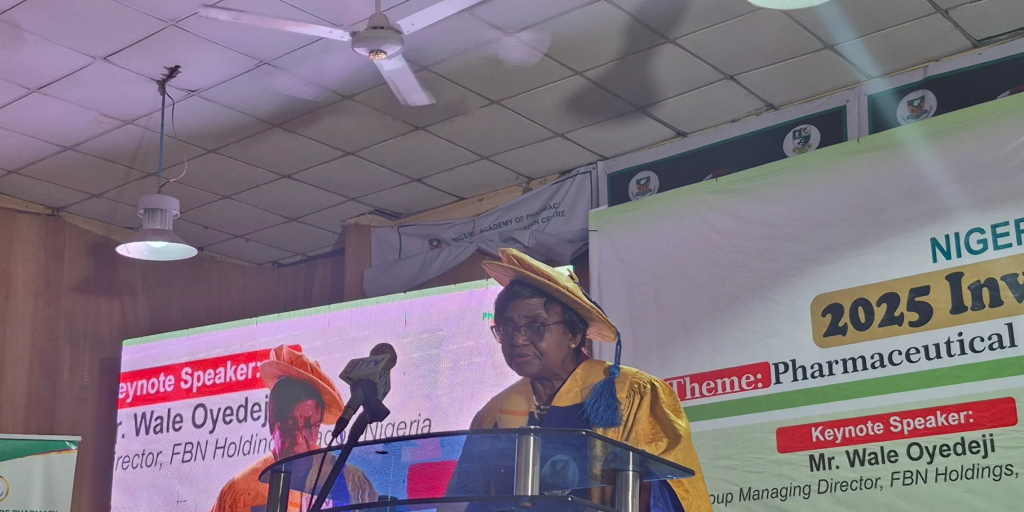
The Director-General of the agency, Prof. Mojisola Adeyeye, disclosed this on Thursday at the 2025 Investiture and Public Lecture of the Nigeria Academy of Pharmacy in Lagos. She described the progress as a sign of Nigeria’s steady move toward self-sufficiency in pharmaceutical production.
“This reduction shows we are making gradual progress in our journey toward local manufacturing and health security,” Mrs Adeyeye said.
In 2021, NAFDAC had set an ambitious target of cutting drug importation from 70 per cent to 30 per cent by 2025 through local production. While the current 10 per cent reduction shows some progress, Mrs Adeyeye admitted the country remains far from meeting that goal.
She credited the improvement to policy reforms and regulatory innovations that have encouraged investment in local pharmaceutical manufacturing.
Among these is the “5plus5” regulatory scheme, which gives companies a final five-year window to import drugs that can be produced locally. After that, they must either build local factories or partner with Nigerian producers.
According to her, over 30 per cent of new pharmaceutical companies in Nigeria emerged from this initiative, with many importers transitioning to local production or contract manufacturing partnerships.
Mrs Adeyeye also revealed that NAFDAC has expanded the list of medicines banned from importation those that can now be made domestically, from nine to 36.
“The goal is to stimulate sustainable local manufacturing while protecting our population from substandard or fake drugs,” she said.
Reflecting on her tenure since 2017, the NAFDAC boss said her early years were spent rebuilding the agency’s credibility and systems.
“When I joined in 2017, I met an agency with almost nothing. We had to retrain ourselves, document our processes, and align with international best practices,” she explained.
In 2022, NAFDAC achieved the World Health Organisation’s (WHO) Maturity Level 3 certification, a globally recognized standard for strong regulatory systems. The agency successfully retained that certification during a 2024 reevaluation, becoming the first country in Africa to do so.
Under Mrs Adeyeye’s leadership, Nigeria now boasts two WHO-prequalified medicine manufacturers and its first WHO-prequalified medical device company.
“Before now, we had none. Today, we have prequalified companies producing at international standards. It proves we can do it,” she said.
She also highlighted the development of a track-and-trace system to monitor vaccines, narcotics, and newborn health commodities, a system that makes Nigeria the first country in Africa and the second globally to deploy it nationwide.
NAFDAC, she said, is also working to bridge the gap between universities and industry through partnerships with institutions such as the University of Lagos and Federal University of Technology, Minna.
These collaborations allow staff to pursue postgraduate degrees while working full-time, promoting research-driven innovation.
“Without academia, we cannot achieve sustainable R&D. That’s part of nation building,” she added.
In his keynote address, Wale Oyedeji, Group Managing Director of FBN Holdings, stressed that pharmaceutical innovation is essential to national development.
“Pharmaceutical innovation is science, but it is also business, governance, and nation building,” Mr Oyedeji said.
“We must increase investment in research and development beyond 0.2 per cent and look within, like India did.”
He warned that Nigeria’s dependence on imports, poor R&D funding, and brain drain continue to hinder growth in the sector.
The President of the Nigeria Academy of Pharmacy, Lere Baale, said the Academy remains committed to positioning pharmacy at the heart of Nigeria’s progress.
“Pharmacy is central to national development — from health security to industrial growth and policy reform,” Mr Baale said.
“We are redefining pharmacy beyond dispensing medicines to leadership in innovation and healthcare transformation.”